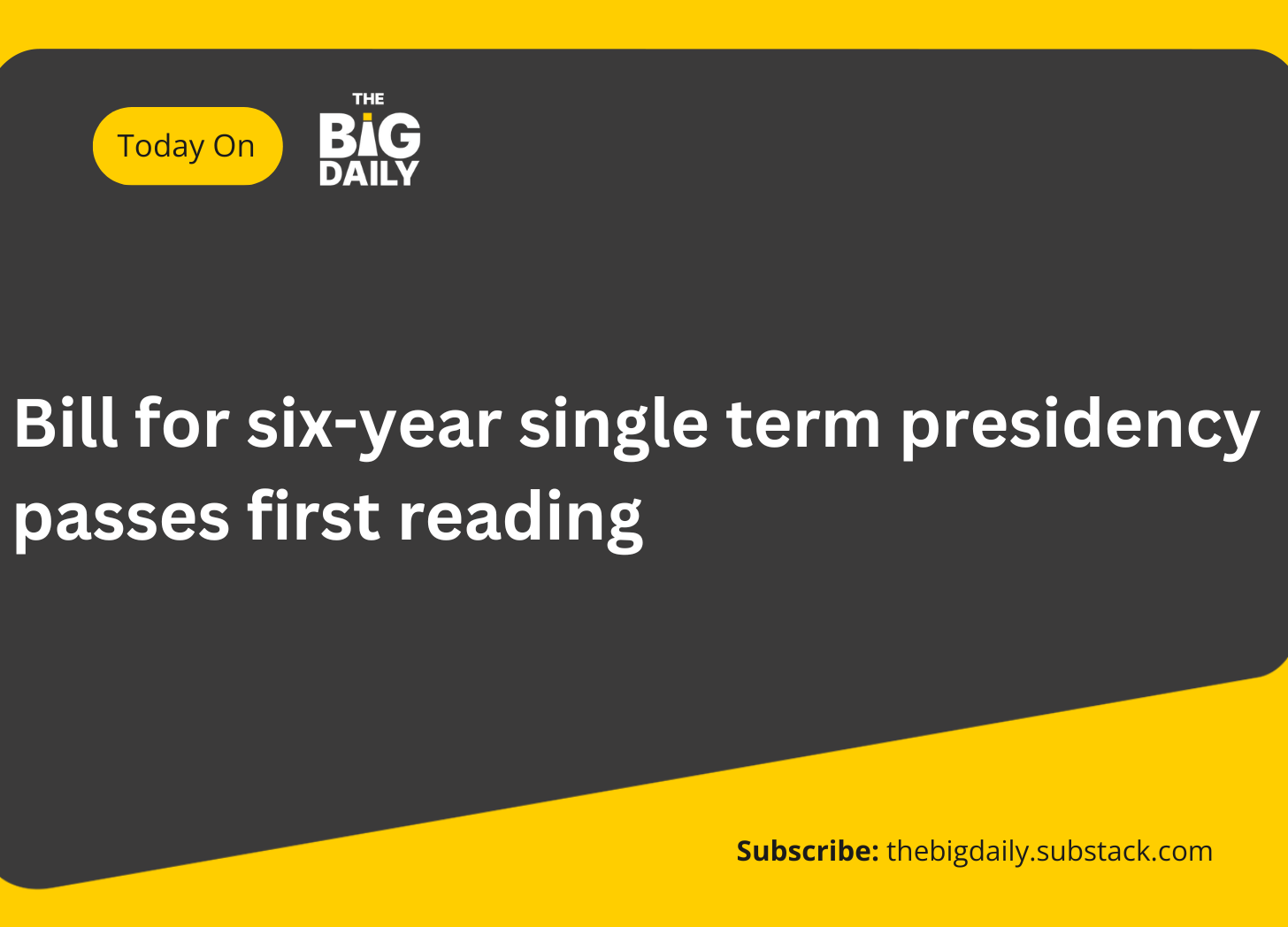It’s Friday, Big Brains! I hope you have Friday plans because I do and this time, they are not getting cancelled. I even have a Saturday and Sunday plan too. What a time to be alive! You already know the drill, whatever you do this weekend, don’t forget to binge-read The Big Daily!
- Margaret
Word count: ~ 1,000
Reading time ~ 3 mins
Let’s get into today’s edition:
Bill for six-year single term presidency passes first reading
Nigerian doctor-patient ratio worsens by 1000% compared to WHO recommendation
Kenyan police ban protests in Nairobi
The Big Deal
Bill for six-year single term presidency passes first reading
Nigerian lawmakers are cooking but we’re not sure Nigerians are going to like what they’re cooking. The 1999 constitution makes it clear that presidents, governors and local government chairmen are to serve single terms that span across four years. But the House of Representatives is seeking to amend the law and extend the duration of a single term to six years. Unfortunately (or fortunately if we’re being vague), this bill has passed through the first reading.
If the new bill is passed, the single term for presidents, governors and local government chairmen will change from four years to six-years. If there is a re-run election and the same person wins, they are going to be allowed to serve for another six years – making their rule 12 years. The bill also says that if Nigeria is ever at war and it’s not possible to hold an election during the war, the National Assembly can extend the six-year single term by a maximum of six months.
Why is this a big deal?
Nigerians have 99,999 problems and the need to extend the present administration’s rule to six years isn’t one. Millions of Nigerians are struggling to eat in 2024 than they’ve ever had to in their lives and some of these people attribute their present suffering to President Tinubu’s reforms and are anticipating the end of his four-year rule, not an extension.
Based on history, Nigeria has not been the luckiest with leaders. The country has had more corrupt and out-of-touch leaders than good ones. If this bill is passed, Nigerians will be forced to deal with what many people would describe as six years of corruption and torture. We also wonder why the House of Representatives is so eager to pass this law when there are more pressing matters they need to address.
Nigerian doctor-patient ratio worsens by 1,000% compared to WHO recommendation
If there’s ever a worst time to fall sick as a Nigerian, it’s now.. There’s a shortage of medical practitioners in the country, and it’s worse than you think.
According to the President of the Nigerian Medical Association (NMA), Prof Bala Audu, Nigeria's doctor-patient ratio is now about 1 doctor to 10,000 people which is far below the 1 doctor to 500 people the World Health Organization (WHO) recommends. He blames it on the "Japa Syndrome," which is basically a simpler term for the mass migration of healthcare workers from Nigeria.
Prof. Audu said the situation is getting worse and the doctors who have chosen to stay in the country have no choice but to work for longer hours than they should.
What’s FG doing about this?
The government has been trying to keep doctors and nurses using different methods except creating a better working environment for them. In March, they introduced new rules for nurses applying to work abroad. The rule stated that applicants must have two years of work experience in Nigeria and get letters of good standing from their current employer and previous training college. They also added that applicants will be required to wait at least six months to get these documents, a process that used to take a week.
The government also banned leave of absence for doctors who intend to leave Nigeria for specific reasons, saying they must “henceforth resign their appointment before embarking on such journeys''. This rule has left doctors who want to leave the country for educational or training purposes no other choice but to resign before they leave the country.
Besides their effort to keep doctors and nurses in the country with criticised regulations, the Minister of State for Health, Dr. Tunji Alausa, mentioned earlier in the year that the yearly enrollment of Nurses, which used to be about 28,000, has been increased to 68,000. By the end of the year, it should go up to 120,000.
Kenyan police ban protests in Nairobi
The activism of Kenyan youths, which has sparked international curiosity and national action, is taking an interesting turn. Police in the country have placed a ban on the protests in Nairobi's city centre and nearby areas "until further notice”.
Nairobi has been the main spot of these youth-led protests that were sparked by opposition to tax hikes. The focus of the protests have now shifted to the demand for President William Ruto’s resignation. So far, Ruto has taken a few steps to appeal to the youths including withdrawing the controversial finance bill, dismissing his entire cabinet, and the removal of the head of police. But protesters are still demanding more action against corruption and accountability for the deaths of demonstrators. The Kenya National Commission on Human Rights reports at least 50 protesters have been killed and 413 injured since the protests started on June 18.
In a statement released on Wednesday, the police declared, “No demonstrations will be permitted in the Nairobi Central Business District and its surroundings until further notice to ensure public safety.” This decision has sparked outrage online, with critics arguing that the police lack the authority to impose such a ban, as Kenyan law allows citizens the right to demonstrate.
Acting head of police Douglas Kanja defended the ban, claiming “credible intelligence” indicated that criminal groups were planning to exploit the protests. He added, “Criminals have continued to infiltrate the protesting groups, resulting in a troubling trend of disorderly and destructive conduct.”
With a heavy police presence already in the capital, all eyes are on Nairobi as tensions continue to build up.
The Big Picks
FG, Labour Agree On ₦70,000 Minimum Wage: Minister of Information Mohammed Idris has recently announced that the Federal Government and Organized Labour leaders have agreed to set ₦70,000 as the new minimum wage for Nigerian workers.
Reps Cut Own Salaries By 50% For Six Months: Lawmakers in the House of Representatives have decided to cut their salaries by 50% for the next six months to help support Nigerians during these difficult times.
If you enjoyed this edition of the newsletter, don’t forget to subscribe and share. You can also leave feedback for us in the comments or by filling out this form.







